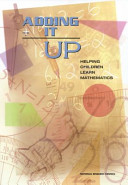Number
Number is a rich, many-sided domain whose simplest forms are compre- hended by very young children and whose far reaches are still being explored by mathematicians. Proficiency with numbers and numerical operations is an important foundation for further education in mathematics and in fields that use mathematics. Because much of this report attends to the learning and teaching of number, it is important to emphasize that our perspective is considerably broader than just computation. First, numbers and operations are abstractions—ideas based on experience but independent of any particular experience. Communication about numbers, therefore, requires some form of external representation, such as a graph or a system of notation. The use- fulness of numerical ideas is enhanced when students encounter and use multiple representations for the same concept. Second, the numbers and operations of school mathematics are organized as number systems, such as the whole numbers, and the regularities of each system can help students learn with understanding. Third, numerical computations require algo- rithms—step-by-step procedures for performing the computations. An algo- rithm can be more or less useful to students depending on how it works and how well it is understood. And finally, the domain of number both supports and is supported by other branches of mathematics, including algebra, measure, space, data, and chance. Our decision to address the domain of number was a pragmatic one; in no way does it imply that the elementary and middle school curriculum should be limited to arithmetic.
Notes:
Mathematics summarized.
Folksonomies: education mathematics
Taxonomies:
/science/mathematics (0.670455)
/technology and computing/internet technology/email (0.401282)
/science/mathematics/arithmetic (0.401255)
Keywords:
middle school curriculum (0.922744 (neutral:0.000000)), number (0.801146 (positive:0.433232)), simplest forms (0.762225 (positive:0.463478)), young children (0.751073 (neutral:0.000000)), numerical computations (0.746159 (neutral:0.000000)), mathematics (0.730423 (positive:0.589166)), numbers (0.724268 (positive:0.035730)), numerical operations (0.720545 (positive:0.315449)), numerical ideas (0.713310 (neutral:0.000000)), many-sided domain (0.706182 (positive:0.463478)), Number Mathematics (0.700340 (neutral:0.000000)), multiple representations (0.693604 (neutral:0.000000)), experience. Communication (0.681671 (positive:0.224803)), important foundation (0.681339 (positive:0.589166)), external representation (0.680300 (neutral:0.000000)), rithms—step-by-step procedures (0.668238 (neutral:0.000000)), number systems (0.647296 (neutral:0.000000)), school mathematics (0.629389 (neutral:0.000000)), students (0.520840 (positive:0.297074)), fulness (0.419619 (neutral:0.000000)), regularities (0.418541 (positive:0.309150)), mathematicians (0.398138 (neutral:0.000000)), Proficiency (0.394301 (positive:0.315449)), notation (0.377666 (neutral:0.000000)), report (0.375962 (neutral:0.000000)), learning (0.375841 (neutral:0.000000)), abstractions—ideas (0.374066 (neutral:0.000000)), teaching (0.373997 (neutral:0.000000)), graph (0.373763 (neutral:0.000000)), perspective (0.373672 (positive:0.622621))
Entities:
rithm:Person (0.673671 (positive:0.284999))
Concepts:
Number (0.989548): dbpedia | freebase
Mathematics (0.815317): dbpedia | freebase | opencyc
Education (0.765563): dbpedia | freebase | opencyc
Real number (0.674556): dbpedia | freebase | opencyc
Arithmetic (0.664733): dbpedia | freebase | opencyc
Computer science (0.569490): dbpedia | freebase | opencyc
Knowledge (0.567919): dbpedia | freebase
Natural number (0.526259): dbpedia | freebase | opencyc





